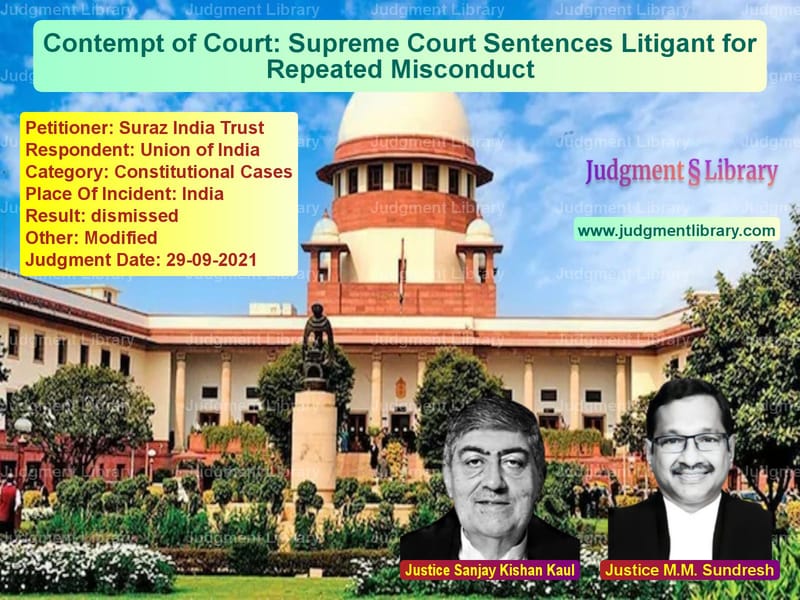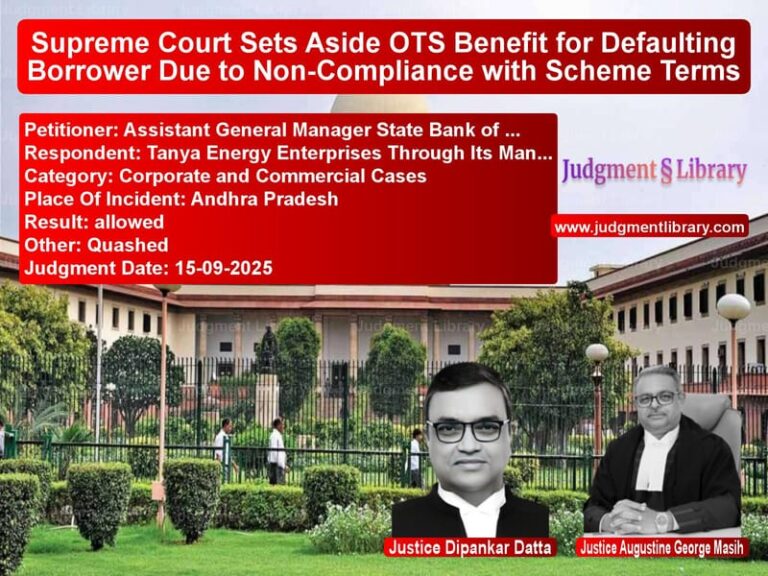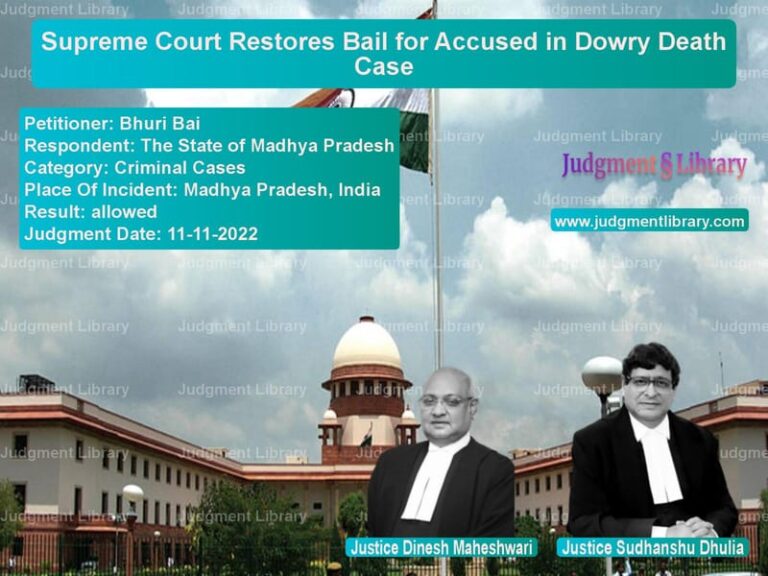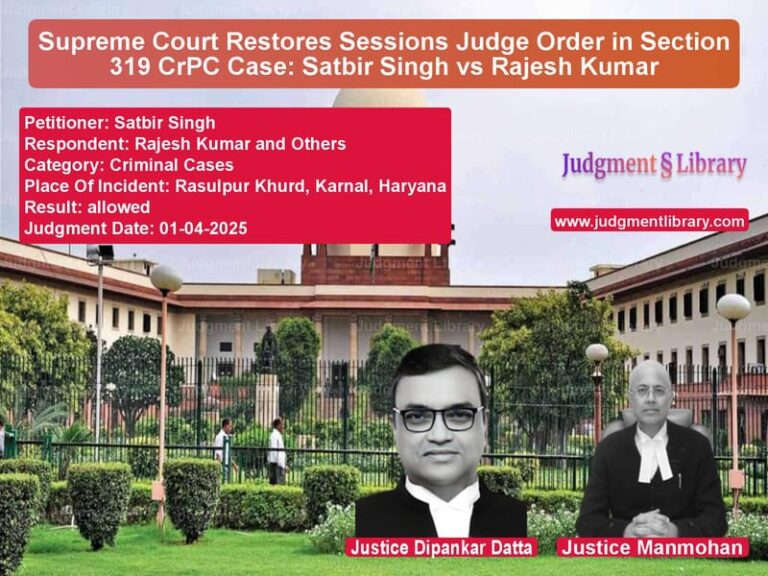Contempt of Court: Supreme Court Sentences Litigant for Repeated Misconduct
The case of Suraz India Trust vs. Union of India marks an important ruling in the Indian judiciary’s effort to curb the misuse of Public Interest Litigations (PILs) and prevent individuals from undermining the dignity of courts. The Supreme Court of India had to determine whether the persistent and malicious behavior of a litigant, Mr. Rajiv Daiya, amounted to contempt of court.
Background of the Case
The petitioner, Suraz India Trust, through its Chairman, Mr. Rajiv Daiya, had filed multiple PILs before the Supreme Court and various High Courts. Over time, it became evident that the trust was abusing the legal process, filing frivolous petitions, and attempting to scandalize the judiciary. In 2017, the Supreme Court had imposed a cost of Rs. 25 lakhs on Mr. Daiya, directing him to deposit it with the Supreme Court Advocates-on-Record Welfare Trust.
Despite being given ample opportunities, Mr. Daiya refused to pay the costs and continued filing vexatious petitions. The present case arose when the Supreme Court took note of his repeated misconduct and deliberate attempts to undermine the authority of the judiciary.
Key Legal Issues
- Whether the persistent filing of frivolous PILs amounts to contempt of court.
- Whether making disparaging remarks against judges and judicial staff constitutes contempt.
- What actions the judiciary can take to prevent abuse of PILs and protect the dignity of the institution.
Petitioner’s Arguments (Suraz India Trust & Rajiv Daiya)
The petitioner contended:
- That he had the right to file PILs in public interest and that his actions were not aimed at undermining the judiciary.
- That he had submitted an unconditional apology and sought waiver of the costs imposed on him.
- That he had been denied a fair hearing and was being unfairly targeted by the judiciary.
- That he had approached the President of India and other authorities to seek justice.
Respondent’s Arguments (Union of India & Judiciary)
The respondents argued:
- That the petitioner had a history of filing frivolous and baseless PILs, wasting judicial time.
- That Mr. Daiya had made serious allegations against sitting judges, registry officials, and the entire judicial system.
- That his conduct demonstrated a pattern of contemptuous behavior, showing no regard for judicial orders.
- That allowing such behavior would set a dangerous precedent, undermining the integrity of the judiciary.
Supreme Court’s Judgment
The Supreme Court found Mr. Daiya guilty of contempt of court and sentenced him accordingly. The key observations made by the Court were:
“The raison d’être of contempt jurisdiction is to maintain the dignity of judicial forums. It is not a vindictive exercise nor are inappropriate statements by themselves capable of lowering the dignity of a Judge.”
“However, where despite all latitude, a perennial litigant seeks to justify his existence by throwing mud at all and sundry, the Court has to step in.”
Final Directions:
- The Supreme Court sentenced Mr. Rajiv Daiya for contempt and directed authorities to take necessary actions.
- The Court ordered that he be barred from filing any PILs in the future.
- The costs imposed earlier were to be recovered as arrears of land revenue.
Impact of the Judgment
- Sets a precedent against frivolous PILs and abuse of judicial process.
- Ensures that courts remain focused on genuine matters of public interest.
- Reaffirms that the judiciary will not tolerate attempts to scandalize or undermine its authority.
- Prevents individuals from using PILs as a tool for personal vendettas.
Conclusion
The Supreme Court’s ruling in Suraz India Trust vs. Union of India sends a strong message that misuse of judicial resources will not be tolerated. It reaffirms that while PILs are an important tool for social justice, they must be used responsibly. By holding the petitioner accountable for his actions, the Court has upheld the integrity of the judicial system and ensured that frivolous litigations do not hinder the delivery of justice.
Petitioner Name: Suraz India Trust.Respondent Name: Union of India.Judgment By: Justice Sanjay Kishan Kaul, Justice M.M. Sundresh.Place Of Incident: India.Judgment Date: 29-09-2021.
Don’t miss out on the full details! Download the complete judgment in PDF format below and gain valuable insights instantly!
Download Judgment: suraz-india-trust-vs-union-of-india-supreme-court-of-india-judgment-dated-29-09-2021.pdf
Directly Download Judgment: Directly download this Judgment
See all petitions in Public Interest Litigation
See all petitions in Contempt Of Court cases
See all petitions in Separation of Powers
See all petitions in Judgment by Sanjay Kishan Kaul
See all petitions in Judgment by M.M. Sundresh
See all petitions in dismissed
See all petitions in Modified
See all petitions in supreme court of India judgments September 2021
See all petitions in 2021 judgments
See all posts in Constitutional Cases Category
See all allowed petitions in Constitutional Cases Category
See all Dismissed petitions in Constitutional Cases Category
See all partially allowed petitions in Constitutional Cases Category







